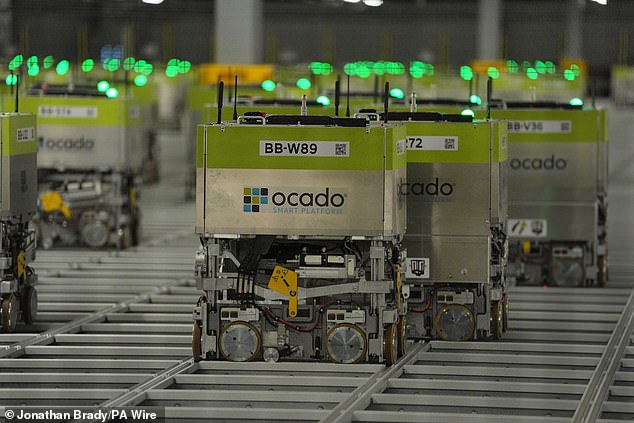Supermarket sales growth slows as struggling Asda lags behind its peers
- Asda lagged the sector, with sales down 3.5%, NIQ said
Grocery sales growth slowed last month as consumers held back their spending ahead of Black Friday and Christmas, industry data shows.
Market researcher NIQ said supermarket sales rose 4 percent year-on-year in the four weeks to November 2, up from 4.7 percent
Asda continued to lag behind the sector, with sales down 3.5 percent and market share loss of 1 percentage point over the year.
Lagging: Asda lagged behind in the sector, with sales down 3.5%
Last week, Asda chairman Stuart Rose said the grocer had “lost the plot” but the matter was solvable.
Following this week’s data from Kantar, NIQ said the fastest growing grocers in Britain were online player Ocado and discounter Lidl, with growth over the 12 weeks to November 2 of 16.1 percent and 11.9 percent respectively.
NIQ said Marks & Spencer took third place with growth of 11.4 per cent, while market leader Tesco, up 4.7 per cent, and number two Sainsbury’s, up 4.6 per cent, also gained market share.
Both Tesco and Sainsbury’s predict strong Christmas business.
Mike Watkins, head of retail and business insight at NIQ in the UK, said: ‘Shoppers have been cautious so far and it is clear they are cutting back on essential groceries to afford treats and treats.’

Sales: NIQ said the fastest growing grocers in Britain were online player Ocado and discounter Lidl
He cited “a polarized consumer,” with 50 percent of households continuing to feel pressure on their personal finances.
NIQ said general merchandise sales fell 1.4 percent in value terms, while volume sales fell 5.5 percent.
The boss of Sainsbury’s has warned that changes to national insurance introduced by the government in the autumn budget will push up prices.
Simon Roberts said Rachel Reeves’ decision to increase the NI by 1.2 percentage points to 15 per cent from April will add £140 million to the supermarket group’s tax bill next year.
Reeves also lowered the threshold for when companies will start paying employer NICs from £9,100 to £5,000 per year. She also increased the minimum wage for most adults by 6.7 percent from April.
Roberts was also critical of the government for not doing enough in the autumn budget to cut retailers’ business rates and tax changes that impact farmers.
Marks & Spencer CEO Stuart Machin said the supermarket chain cannot rule out price increases after the autumn budget.
DIY INVESTMENT PLATFORMS

A. J. Bell

A. J. Bell
Easy investing and ready-made portfolios

Hargreaves Lansdown

Hargreaves Lansdown
Free fund trading and investment ideas

interactive investor

interactive investor
Invest for a fixed amount from € 4.99 per month

Sax

Sax
Receive €200 back in trading fees

Trade 212

Trade 212
Free trading and no account fees
Affiliate links: If you purchase a product, This is Money may earn a commission. These deals have been chosen by our editors because we believe they are worth highlighting. This does not affect our editorial independence.
